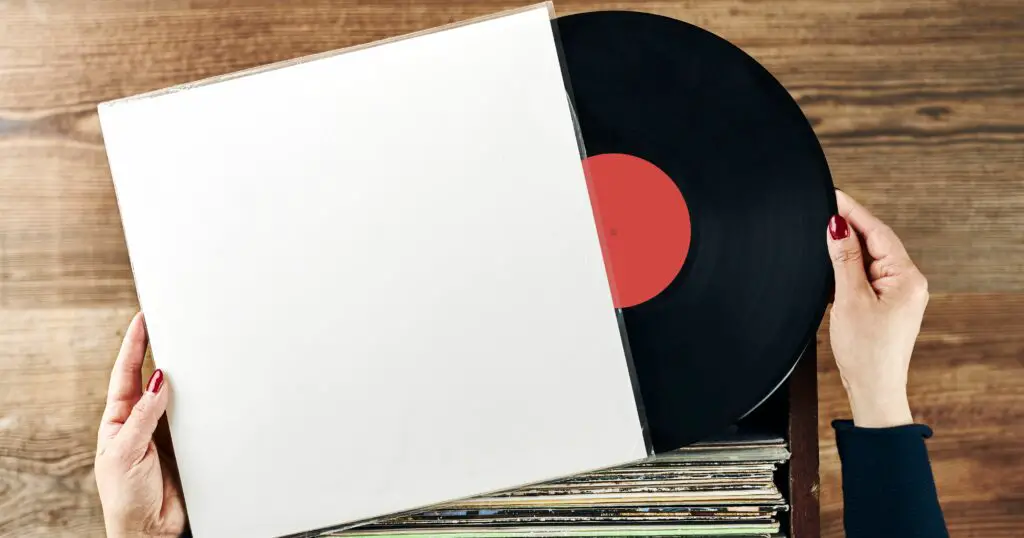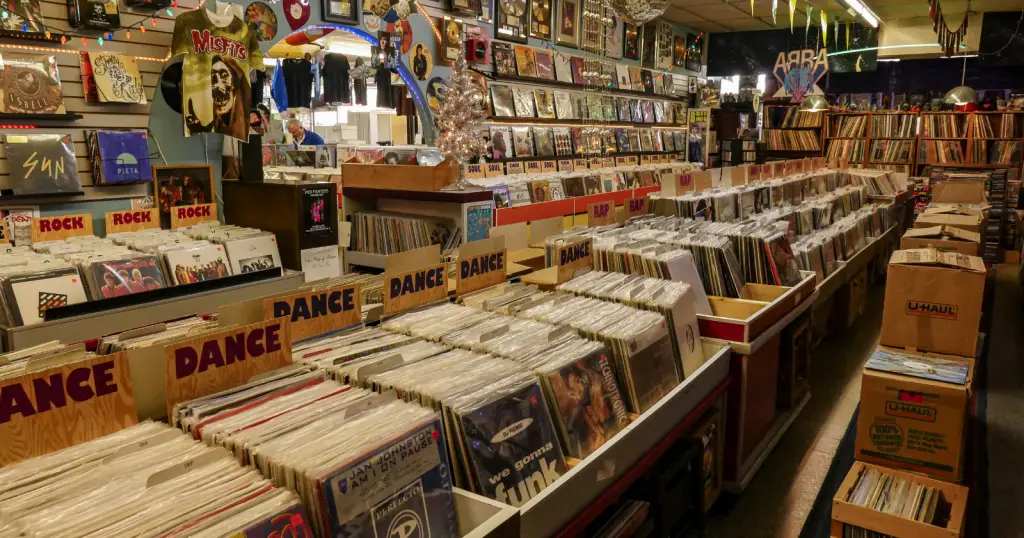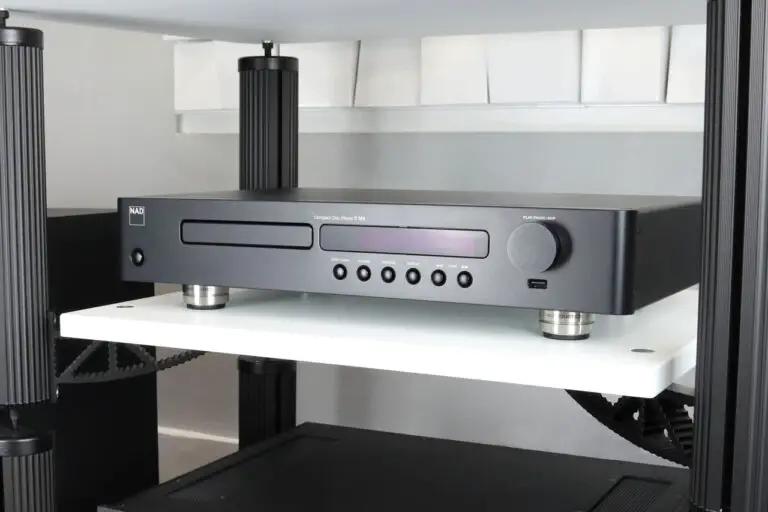Are you a vinyl collector? Do you feel frustrated by the damage your favorite albums have suffered, from bent sleeves to scratched surfaces and worn artwork? If so, it’s possible that improper storage is to blame. Knowing how to store vinyl records can make a huge difference in the longevity of your record collection.
In this article, we’ll share all the essential information you need to know to store your vinyl records properly. From purchasing protective sleeves to understanding the environmental factors that impact your records, we’ll cover everything you need to know to keep your collection safe and sound.
Key Takeaways
- Proper storage can greatly increase the longevity of your vinyl records.
- Protective sleeves and a sturdy shelf are essential for proper storage.
- Maintaining the right temperature and humidity levels is crucial for protecting your records.
Related Posts:

How To Pack And Store Vinyl Records
If you want to keep your vinyl records in good condition, purchase protective sleeves. These sleeves will help protect your records from dust, pressure, warping, scratches, and other damage. Here are some tips on purchasing and using protective sleeves for your vinyl records.
Buy Inner and Outer Protective Record Sleeves
When purchasing protective sleeves for your vinyl records, buy inner and outer ones. Choosing the proper inner sleeves is essential to protect the vinyl from scratches, while outer sleeves protect the record cover from ring wear and other damage. You can purchase these sleeves from second-hand music and record shops or online retailers like Amazon. Make sure to buy sleeves that are the right size for your records, typically 7, 10, or 12 inches.
Avoid buying cheap and under-rated sleeves, as they may not provide adequate protection and may even damage or discolor your records over time.
How to Properly Store Vinyl Records
To properly store your vinyl records, separate the record from its case and place it in the inner sleeve and the case in the outer sleeve. If the record has a protective factory film, leave it on to provide extra protection. Ensure the sleeve’s open side lines up with the open side of the record case.
Keep Changing the Damaged Sleeves When Felt Required
Over time, your sleeves may become worn out or susceptible to mildew or mold infestation. Change your sleeves when necessary to keep your vinyl records protected and safe. This will help prevent damage to your records and ensure they stay in good condition for years.
Avoid Touching the Grooves While Taking Out to Play
Avoid touching the grooves with your fingers when taking your vinyl record out to play. The dirt and oil from your hands can damage the record and cause distortion. Instead, hold the record by its center circle and edge to avoid touching the grooves.
Following these tips can help protect your vinyl records and ensure they stay in good condition. Remember to purchase high-quality protective sleeves, keep the disc and case in separate inner and outer sleeves, change damaged sleeves when necessary, and avoid touching the grooves while taking them out to play.
Related Posts:
Watch this video, How to Store Vinyl Records:
Environmental Factors in Storing Vinyl Records
Vinyl records are fragile and require proper storage to ensure their longevity. The following environmental factors are crucial to consider when storing vinyl records:
Light
Exposure to direct sunlight can damage vinyl records, especially when it comes to HV lights. Therefore, you should avoid storing your records in areas with direct sunlight and instead opt for a cool, dry place with no UV lights.
Temperature
Extreme temperatures can cause warping and damage to vinyl records, leading to playback issues. Vinyl records should be stored in environments with temperatures ranging between 65°F (18°C) and 70°F (21°C). Avoid areas that experience significant temperature fluctuations, such as attics or basements with inadequate insulation.
Humidity
High humidity levels can cause mold and water damage to vinyl records. Storing records in a relatively dry environment with a humidity level between 30% to 40% is best. Hygrometers are cheap and efficient tools that measure humidity.
The most suitable atmosphere to keep your vinyl records includes a temperature of around 50 to 60 degrees Fahrenheit and a 30 to 40 percent humidity level. A basement in an average house has all the ideal conditions to keep vinyl records as they remain cooler without intense humidity.
When storing vinyl records, it’s important to ensure proper air circulation and avoid stacking them on top of each other. Vinyl records should be stored on a strong shelf or in a nice box. Inner sleeves are essential, and pairing them with an outer sleeve for double protection is best. Alternatively, invest in vinyl bags for added protection.
In conclusion, when storing vinyl records, it’s important to consider the environmental factors of light, temperature, and humidity. By paying attention to these factors and following the tips mentioned above, you can create an environment that safeguards your collection and enhances your listening experience.

How to Store Vinyl Records: Safe-Keeping
Vinyl records are precious and require proper storage to maintain their quality. Here are some final tips to help you store your vinyl records properly:
- Keep them in a dry environment with 35-40% relative humidity.
- Use hygrometers to measure humidity levels.
- Don’t stack your records on top of each other or with other items.
- Use inner sleeves to protect your records from dust and scratches.
- Store your records upright in a poly sleeve to prevent warping and ring wear.
Follow these tips, and your vinyl records will continue to sound as good as new for years to come.
Frequently Asked Questions
What is the best way to store vinyl records?
Vinyl records should be stored upright in their original sleeves and outer jackets. This helps prevent warping and damage to the records. It is also recommended to use poly sleeves for additional protection against dust and ring wear to the outer sleeve.
How should I store my vinyl records to prevent damage?
To prevent damage, vinyl records should be stored in a cool, dry place away from direct sunlight and extreme temperatures. Avoid overcrowding and stacking records, as this can cause warping and damage. Use sturdy shelves and avoid cardboard storage.
Is it better to store vinyl records flat or upright?
It is better to store vinyl records upright to prevent warping and damage. Storing records flat can cause them to warp over time due to the weight of the other records on top of them.
Can vinyl records be stored at an angle?
Vinyl records should not be stored at an angle, which can cause warping and damage. Storing them upright in their original sleeves and outer jackets is best.
What is the ideal temperature for storing vinyl records?
The ideal temperature for storing vinyl records is between 46 to 50°F. Extreme heat or cold can cause warping and damage to the records.
What are some recommended vinyl record storage solutions?
Some recommended vinyl record storage solutions include temperature-controlled storage, sturdy shelves, and plastic storage containers. Choosing a storage solution that protects from dust, humidity, and light exposure is important to prevent damage to the records.






